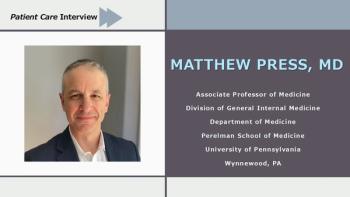
Panelists discuss how atopic dermatitis presents with red, scaly, itchy, dry, and inflamed skin and is commonly diagnosed in childhood, although it can occur at any age, with frequent flares and comorbid conditions like asthma and allergies.

Panelists discuss how atopic dermatitis presents with red, scaly, itchy, dry, and inflamed skin and is commonly diagnosed in childhood, although it can occur at any age, with frequent flares and comorbid conditions like asthma and allergies.

ACP 2025: Matthew Press, MD, shares actionable steps for primary care physicians to adopt a collaborative care model, including how to start small and partner with other practices.

Issaka, from the Fred Hutch Cancer Center, said insurance coverage, a patient's resources, and social determinants of health all factor in the choice.

ACP 2025: GLP-1 medications are advancing obesity care, but lifestyle changes and bariatric surgery remain key components. Laura Davisson, MD, discusses how to personalize treatment strategies.

ACP 2025: Dr Press discusses how the Penn Integrated Care model equips primary care physicians to manage mental health conditions more effectively while reducing burnout.

ACP 2025: Rachel Issaka, MD, MAS, reviewed data from a Kaiser Permanente program that narrowed racial and ethnic disparities in CRC screening compliance and related deaths.

ACP 2025: Lung cancer is rising among nonsmokers, especially women. Kim Sandler, MD, discusses future screening challenges, research insights, and the need to expand screening eligibility.

ACP 2025: Discover how the collaborative care model supports mental health in primary care through team-based care, symptom tracking, and psychiatric consultation—boosting outcomes and reducing burden on clinicians.

ACP 2025. A focused CRC prevention program begins with primary care where support and advocacy for regular screening begins, Issaka stressed.

ACP 2025: Issaka, from the Fred Hutchinson Cancer Center, told internists that three-quarters of CRC deaths can be attributed to 3 types of screening failure.

ACP 2025: Kim Sandler, MD, outlines key strategies to boost lung cancer screening uptake in primary care.

ACP 2025: Laura Davisson, MD, outlines how PCPs can navigate GLP-1 medication coverage issues and why to consider recent cash-pay options.

ACP 2025: Dr Press explains how primary care clinicians can implement the collaborative care model to integrate mental health services, improve outcomes, and navigate reimbursement.

ACP 2025: Kim Sandler, MD, explains how primary care physicians can use shared decision-making to guide patients through lung cancer screening, emphasizing risk, benefit, follow-up, and smoking cessation.

ACP 2025: Kim Sandler, MD, sat down with Patient Care to discuss the benefits of lung cancer screening, citing a 20% reduction in lung cancer mortality with annual screenings.

A panelist discusses how contemporary therapeutic approaches enable successful management of atopic dermatitis through examination of real-world patient cases that demonstrate effective disease control strategies using the latest treatment options.

A panelist discusses how topical treatments for atopic dermatitis can be strategically selected and applied across the lifespan, with considerations for age-specific needs from infancy through adulthood.

A panelist discusses how effective coordination between primary care providers and dermatologists creates a complementary care model that optimizes atopic dermatitis management through shared decision-making, clear communication pathways, and defined roles for each specialty.

A panelist discusses how treatment selection for atopic dermatitis is influenced by multiple considerations including disease severity, patient age, affected body regions, comorbidities, previous treatment responses, and patient preferences.

A panelist discusses how topical JAK inhibitors and AhR agonists represent emerging therapeutic approaches for atopic dermatitis that target specific inflammatory pathways to provide effective symptom relief with distinct mechanisms of action.

A panelist discusses how topical PDE4 inhibitors provide an effective, non-steroidal treatment option for atopic dermatitis by reducing inflammation and improving symptoms with a favorable safety profile.

A panelist discusses how clinicians can select optimal topical treatments for atopic dermatitis by carefully weighing efficacy against potential side effects to create personalized management plans for patients.

A panelist discusses how primary care practitioners can implement efficient diagnostic protocols and treatment pathways to better manage atopic dermatitis patients within the constraints of busy clinical settings.

A panelist discusses how healthcare providers can effectively identify and manage atopic dermatitis flares across different age groups, highlighting the unique challenges and treatment approaches for both pediatric and adult populations.

Highlights from AAD 2025: Experts share updates on systemic therapy for atopic dermatitis, pediatric rashes, and contact dermatitis for PCPs.

Panelists discuss how providers should actively screen for vasomotor symptoms (VMS), especially given the lengthy wait times to see specialists, emphasizing that education for both patients and health care providers is essential for timely intervention and effective management.

Panelists discuss how there is no change in therapeutic indication based on this particular finding, though it may serve as a beneficial side effect for patients struggling with sleep difficulties.

Panelists discuss how long-term safety data for fezolinetant and elinzanetant remain unavailable, though short-term results show very positive outcomes with significantly higher efficacy than previous treatment options.

Panelists discuss how fezolinetant and elinzanetant can cause liver-related adverse events requiring careful monitoring for drug-induced liver injury, noting that patients typically recover after discontinuation and emphasizing that primary providers are ideally positioned to manage patients with complex comorbidities.

Panelists discuss how emerging therapies demonstrate promising efficacy data while highlighting the adverse metabolic and cardiovascular consequences associated with untreated vasomotor symptoms (VMS).